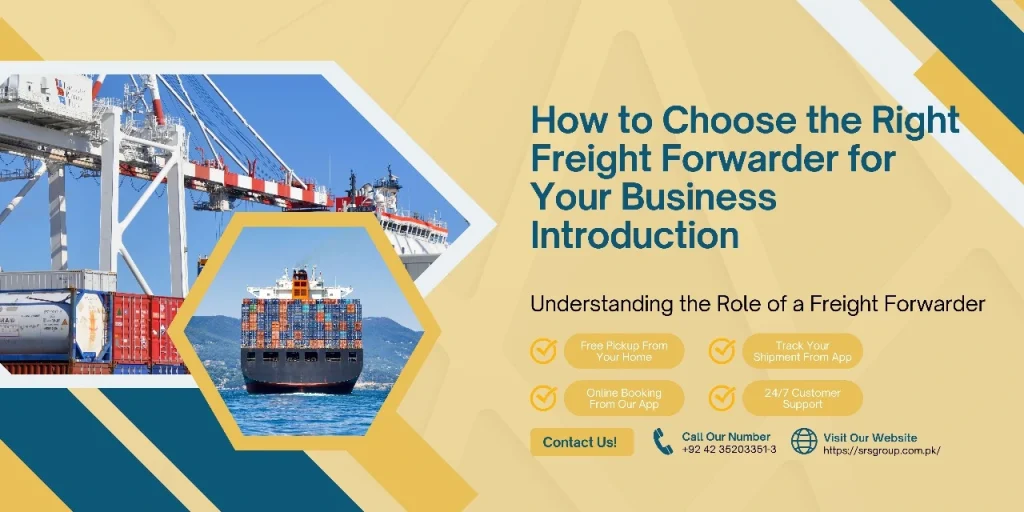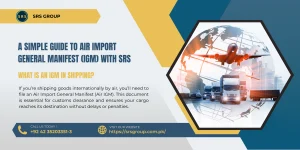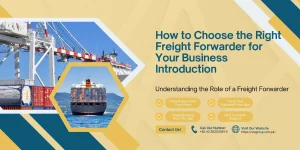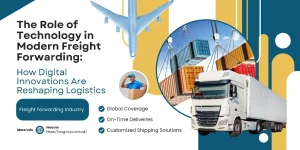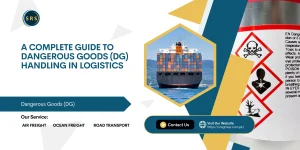Selecting the right freight forwarder is a critical decision for any business engaged in international trade. Whether you’re an importer, exporter, or manufacturer, working with the right logistics partner can streamline your supply chain, reduce costs, and improve efficiency.
A reliable freight forwarder ensures on-time deliveries, proper documentation, and compliance with international regulations. But with so many providers in the market, how do you make the right choice?
In this blog, we’ll walk you through the key factors to consider when selecting a freight forwarding partner, the red flags to watch out for, and how choosing the right forwarder can impact your business.
Understanding the Role of a Freight Forwarder
A freight forwarder acts as a middleman between shippers and transportation services, managing the entire logistics process from pickup to final delivery.
Key Responsibilities of a Freight Forwarder:
✔ Booking cargo space with airlines, ocean carriers, and trucking companies.
✔ Managing customs clearance and regulatory compliance.
✔ Arranging cargo insurance and risk management.
✔ Handling warehousing and distribution.
✔ Providing real-time tracking and logistics updates.
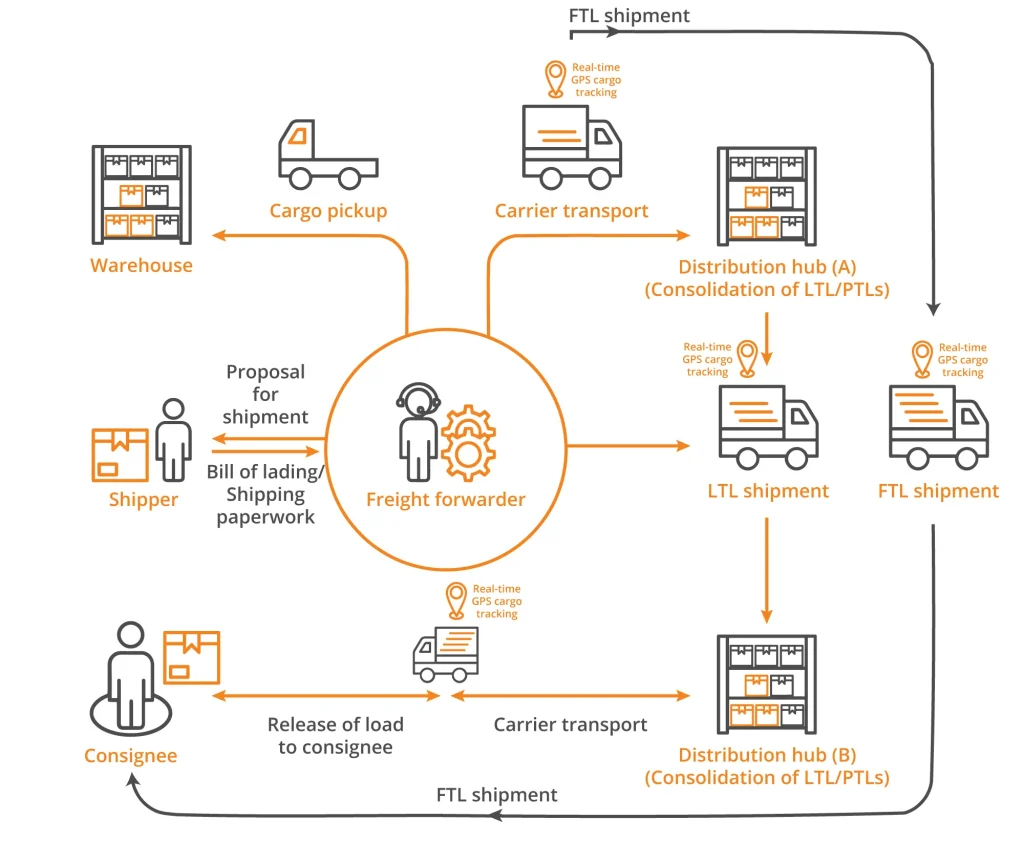
Fact: According to a World Bank report, efficient freight forwarding can reduce logistics costs by up to 15%, making supply chains more cost-effective.
Key Factors to Consider When Choosing a Freight Forwarder
Not all freight forwarders are the same. To find the right partner, you must assess their experience, network, service offerings, and reliability.
A. Industry Experience & Expertise
Freight forwarding involves complex regulations, customs procedures, and risk management. An experienced forwarder understands the challenges of global shipping and can handle issues efficiently.
What to Ask:
✔ How long has the company been in business?
✔ Do they specialize in your industry or type of cargo?
✔ Have they handled shipments to/from your target markets before?
Pro Tip: Look for a freight forwarder with at least 5-10 years of experience in your specific trade lanes.
B. Global Network & Partnerships
A freight forwarder’s global reach determines how effectively they can move cargo across borders. A strong network of agents, carriers, and customs brokers ensures smoother operations.
What to Look For:
✔ Presence in major trade hubs worldwide.
✔ Strong partnerships with airlines, shipping lines, and trucking companies.
✔ Ability to handle both small shipments and large-scale logistics.
Fact: Leading freight forwarders partner with IATA, FIATA, and WCA to ensure global logistics coverage.
C. Service Offerings & Flexibility
Your freight forwarder should provide end-to-end logistics solutions, including:
✔ Multimodal Transportation – Air, sea, and road freight options.
✔ Customs Brokerage – Hassle-free import/export clearance.
✔ Cargo Consolidation – Combining shipments to reduce costs.
✔ Dangerous Goods (DG) Handling – Certified to transport hazardous materials.
✔ Warehousing & Distribution – Storage solutions for smooth supply chains.
What to Ask:
✔ Can they handle time-sensitive or temperature-controlled shipments?
✔ Do they offer customized solutions for unique cargo requirements?
✔ Are they experienced in customs clearance for different countries?
Pro Tip: If your business needs specialized logistics services, choose a freight forwarder with proven expertise in that field.
D. Reputation & Customer Reviews
A freight forwarder’s reputation speaks volumes about their reliability and service quality.
How to Check Credibility:
✔ Look for client testimonials & Google reviews.
✔ Check if they are licensed by industry organizations (e.g., IATA, FIATA).
✔ Ask for references from existing clients.
Fact: 82% of businesses prefer working with freight forwarders recommended by industry peers.
E. Technology & Digital Solutions
Modern freight forwarding relies on AI-driven tracking, digital documentation, and automated logistics management.
Essential Digital Features:
✔ Real-time shipment tracking for better visibility.
✔ Automated freight rate calculators for accurate cost estimates.
✔ AI-powered route optimization for faster deliveries.
Pro Tip: A tech-savvy freight forwarder helps you save time, reduce paperwork, and optimize supply chain performance.
Red Flags to Watch Out For
Lack of industry certifications – Avoid forwarders that aren’t registered with IATA, FIATA, or other recognized bodies.
Hidden fees & unclear pricing – Always ask for detailed rate breakdowns to prevent surprises.
Limited customer support – A reliable forwarder should be available 24/7 for urgent queries.
Poor communication – Delays in response or lack of shipment updates indicate inefficiency.
Fact: 65% of logistics disruptions occur due to poor communication between freight forwarders and clients.
How the Right Freight Forwarder Can Benefit Your Business
Partnering with the right freight forwarder can:
Reduce shipping costs through optimized logistics planning.
✅ Ensure faster, more reliable deliveries with efficient route management.
✅ Minimize risks by handling customs clearance, compliance, and insurance.
✅ Improve supply chain visibility with real-time tracking solutions.
Pro Tip: A great freight forwarder acts as a long-term logistics partner, not just a service provider.
Conclusion: Choose Wisely, Ship Smart
Selecting the right freight forwarder is a strategic decision that impacts your supply chain efficiency, costs, and customer satisfaction. Looking for a reliable freight forwarding partner? At SRS Group, we offer global logistics solutions, real-time shipment tracking, and expert customs clearance services.
Contact us today and let us help you streamline your supply chain!

